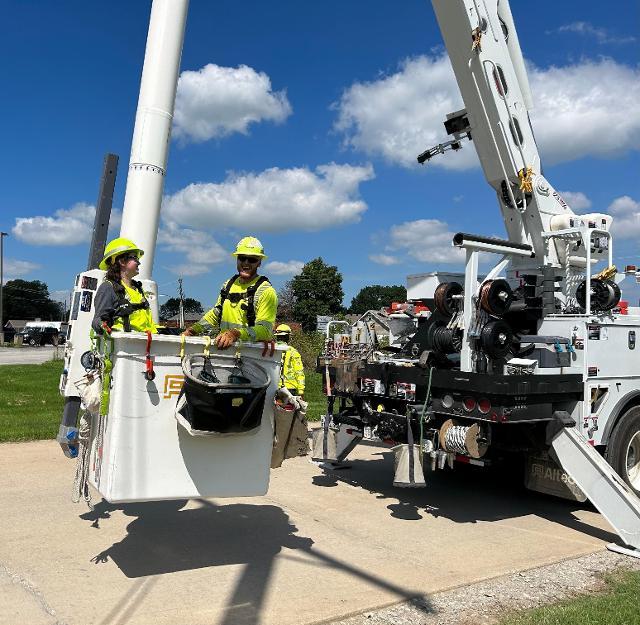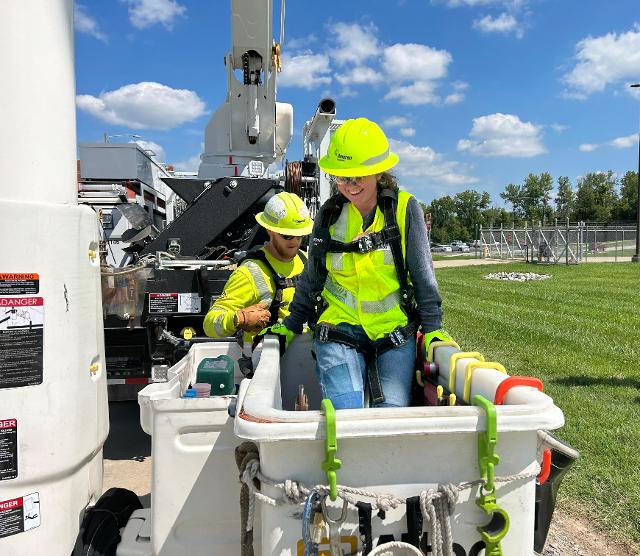 MARYVILLE - You never know where the day will take you. Case in point, this morning I stuffed two rolled-up pairs of socks into the toes of my dad’s work boots and headed to Ameren Illinois’s Maryville Operating Center to experience a day in the life of a lineman.
MARYVILLE - You never know where the day will take you. Case in point, this morning I stuffed two rolled-up pairs of socks into the toes of my dad’s work boots and headed to Ameren Illinois’s Maryville Operating Center to experience a day in the life of a lineman.
Ameren linemen install and repair electrical lines every day, and they work intense hours after storms to restore power to the area. I’ve seen linemen all my life, but until 10 a.m. this morning, I knew very little about what their job actually entails.
Get The Latest News!
Don't miss our top stories and need-to-know news everyday in your inbox.
“You will get sweaty and dirty,” the email invitation had warned. Bring it.
 Upon arrival, I was outfitted with a hardhat, goggles, work vest and cut-resistant gloves. The gloves help linemen avoid splinters or other injuries, like if a nail is sticking out of a utility pole. But for someone unused to wearing them, the gloves introduced a new challenge, and I fumbled putting on my goggles.
Upon arrival, I was outfitted with a hardhat, goggles, work vest and cut-resistant gloves. The gloves help linemen avoid splinters or other injuries, like if a nail is sticking out of a utility pole. But for someone unused to wearing them, the gloves introduced a new challenge, and I fumbled putting on my goggles.
“These vests are unforgiving,” Brian Bretsch, Ameren Illinois spokesperson, noted as we pulled them on and immediately trapped in our body heat. We were lucky it was a cool “blue-sky day,” as the linemen called it. Otherwise, we’d bake.
As it was, we were covered from head to toe to avoid brushing bare skin against live wire. When they’re actually working with electricity, linemen wear insulated rubber gloves that go up to their elbows. Even a small tear in the glove can lead to severe injury as electricity passes through your body and shoots out of a foot or elbow. Double-checking your equipment and staying alert are nonnegotiable.
“It’s our life, at the end of the day,” Lineman Cody said as he showed us how to inspect the gloves. His tone was nonchalant, but the idea was sobering.
The practice pole was not electrified, fortunately; being electrocuted while on a reporting assignment is not exactly what I had in mind when I took this job. (But hey, I’ll do anything for a good story.)
Lineman Chip warned us that being able to climb a pole was the make-or-break moment for most hopeful linemen. While Ameren uses bucket trucks, the arm doesn’t always reach if they can’t get the truck close enough, like if the pole is in an awkward spot or if the right-of-way easement is too narrow. Linemen regularly climb utility poles and stay up there for hours at a time.
 A couple of linemen helped me strap on the climbing equipment, which included velcro straps buckled around my calves and steel shanks hooked to the insides of my ankles. The 15-pound toolbelt also served as a harness, wrapped around the pole. The idea is you lean against the harness, shimmy the rope up the pole and sink the metal shanks into the wood so you can pull your bodyweight up.
A couple of linemen helped me strap on the climbing equipment, which included velcro straps buckled around my calves and steel shanks hooked to the insides of my ankles. The 15-pound toolbelt also served as a harness, wrapped around the pole. The idea is you lean against the harness, shimmy the rope up the pole and sink the metal shanks into the wood so you can pull your bodyweight up.
One shank in and one foot on the ground, I already knew what was going to happen: I was going to fall. Call me a defeatist, but I know my own strength, and I don’t have much. I made it one step up before I slid back down, my ankle shank cleaving a line of splinters in the wooden pole. Another try, another fall.
Lineman Cody had scaled the 40-foot pole in seconds when he demonstrated, but he very kindly did not laugh at me as I unbuckled the equipment and returned to where I feel safest, two feet on the ground.
It didn’t last. A few minutes later, I found myself fastening a full-body harness and climbing into the two-person bucket of a bucket truck.
“Hope you’re not afraid of heights,” Cody said as he yanked the lever to lift us up.
“We’ll find out,” I answered honestly.
Forty feet into the air, he pulled on the insulated gloves and expertly unscrewed the nut on a plastic practice insulator. My turn went a lot less smoothly as I tried to screw it back on; the gloves made me about as dexterous as if I was wearing oven mitts. After giving it the ol’ college try, I leaned back in the bucket and watched the other linemen shrink as Cody took us the rest of the way up, about 55 feet above Maryville.
“This is great!” I lied while white-knuckling the side of the bucket. Cody pointed to Brian holding a camera.
“He wants you to wave,” he said. I lifted a single shaky hand, still dwarfed by the insulated glove, as the bucket swayed in the breeze.
A few hours later, safely back in my office, I’ve learned a few things:
- Linemen deserve way more appreciation, especially after storms.
- Their work is important and more dangerous than we realize.
- I do, in fact, have a healthy fear of heights.
It’s been an enlightening day. Yes, I lost any dreams I had of becoming a lineman, so I’ll probably stick to reporting. But clearly, working at RiverBender.com is never, ever boring.


More like this:

